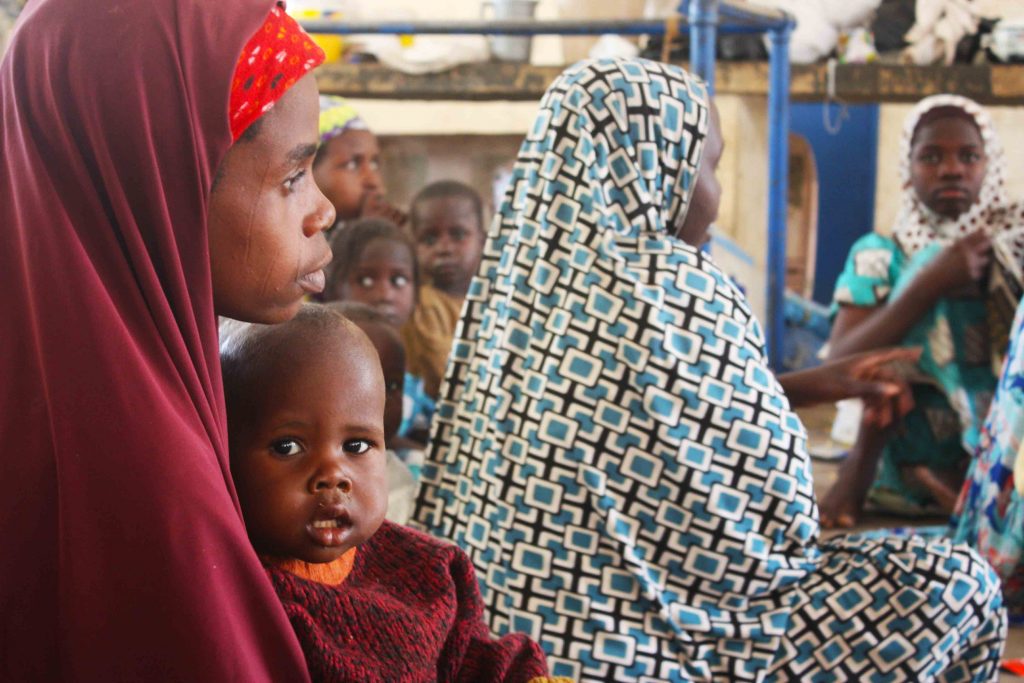The camps for displaced people scattered across northeast Nigeria are supposed to provide safety from Boko Haram violence. But for many women the threat is no longer the jihadists: The danger is inside the camps, and stems from the attitudes of men in general.

Fatima Mohammed* is the “acting women’s leader” in sprawling Bakassi Camp in Maiduguri, the capital of Borno State and birthplace of Boko Haram. She says she’s seeing increasing rates of domestic violence – disputes she’s expected to step in and mediate.
Sewing a prayer cap with the distinctive pattern from her hometown of Gwoza, she recalled a typical recent case. It underlines both the domestic tensions of camp life, and the easily bruised egos of men, which can all too readily flare into violence.
The example was this: A woman’s husband had found work putting up tents in another camp, and they agreed to invest his wage in a small trading business – a common practice among the displaced, who often set aside part of their meagre rations for sale so they can earn some money for medicines, cooking oil, firewood, or any of their many other unmet needs.
The business worked. But the man grew violent, resentful that it was his wife who was making the money. After one beating his wife mocked him “for not having [any] work”. That kicked off more abuse, and he also banned her from the market. That’s when Fatima was called in.
“We told him he would only be spiting himself and his children if he prevented her from going to market.” She also advised the woman not to “mock” or “make [her husband] less of a man”. The issue of the beating remained unbroached.
Men being men
Abubakar Abdulahi*, an employee of the State Emergency Management Agency, laced his fingers over the bridge of his nose and sighed: “Men don’t know how to handle having their role change… this is a very sensitive issue.”
Having worked in several of the internally displaced person (IDP) camps that dot Maiduguri, Abubakar has been thrust into a number of domestic issues.
Speaking with Fatima about the state of affairs in Bakassi, a camp of 21,000 people, he was unsurprised when she reported: “there are months when the food distribution is late and the food is exhausted”. As a result, “women ask their husbands to find some food or some small money, and the men get angry and frustrated because they can’t,” Fatima said, adding that she is usually only called in to adjudicate when “the fighting gets out of hand”.
Miriam Zannah*, who works with the USAID-funded Northeast Regional Initiative in neighbouring Yobe State, said women’s roles are changing as a result of their new responsibilities as widows, orphan caretakers, and breadwinners.
Both Miriam and Abubakar advocate “women’s empowerment” programmes – development schemes that teach women how to sew caps or tailor clothes. But they have both witnessed the backlash from men.
Picking his words carefully, Abubakar explained that “men feel less like men; they always complain that NGOs are giving preference to women.”
Empowered?
The bias towards “women’s empowerment” is not intended to undermine men’s sense of self, but is rather a result of the demographics of the camps’ adult population, which is overwhelmingly female.
The programmes are also an easy sell to the donors for the aid organisations operating in the underdeveloped north. Maternal mortality rates in the region are among the highest in the world and women’s literacy barely cracks double digits, way behind the rest of the country.
The development programmes have not radically altered the lived experiences of women. But “having to cope with being jobless is hard on men,” said a sympathetic Fatima.
The evidence bears her out. A survey conducted by Voices 4 Change in 2016 found that men in Nigeria believe their masculinity is determined by their ability to provide for their family.


One Response
Masculinity doesn’t determine one’s achievement in life, so men should drop that belief and belief right.